Charles E W Bean, Diaries, AWM38 3DRL 606/245/1 - 1915 - 1925 - Part 11
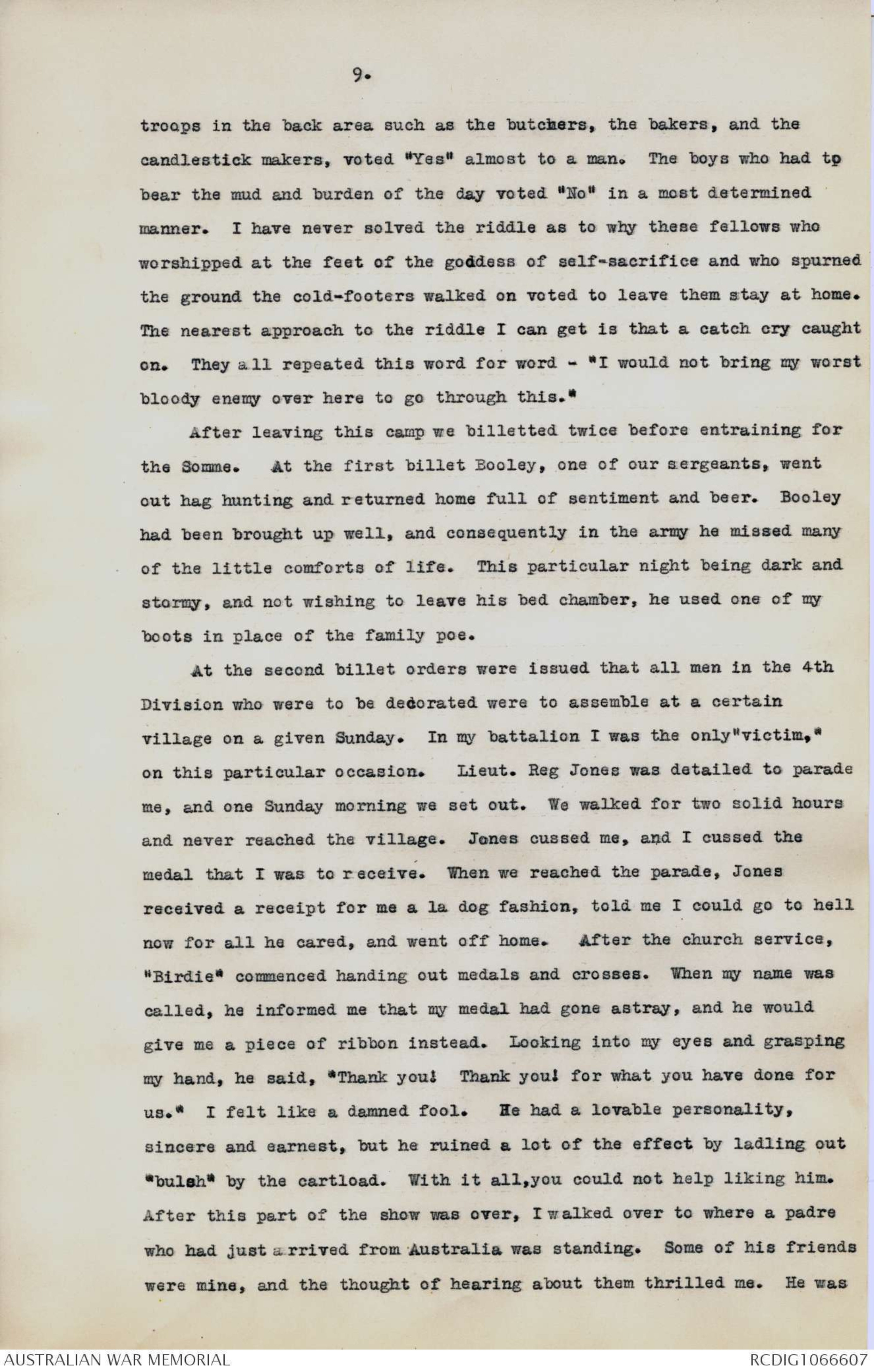
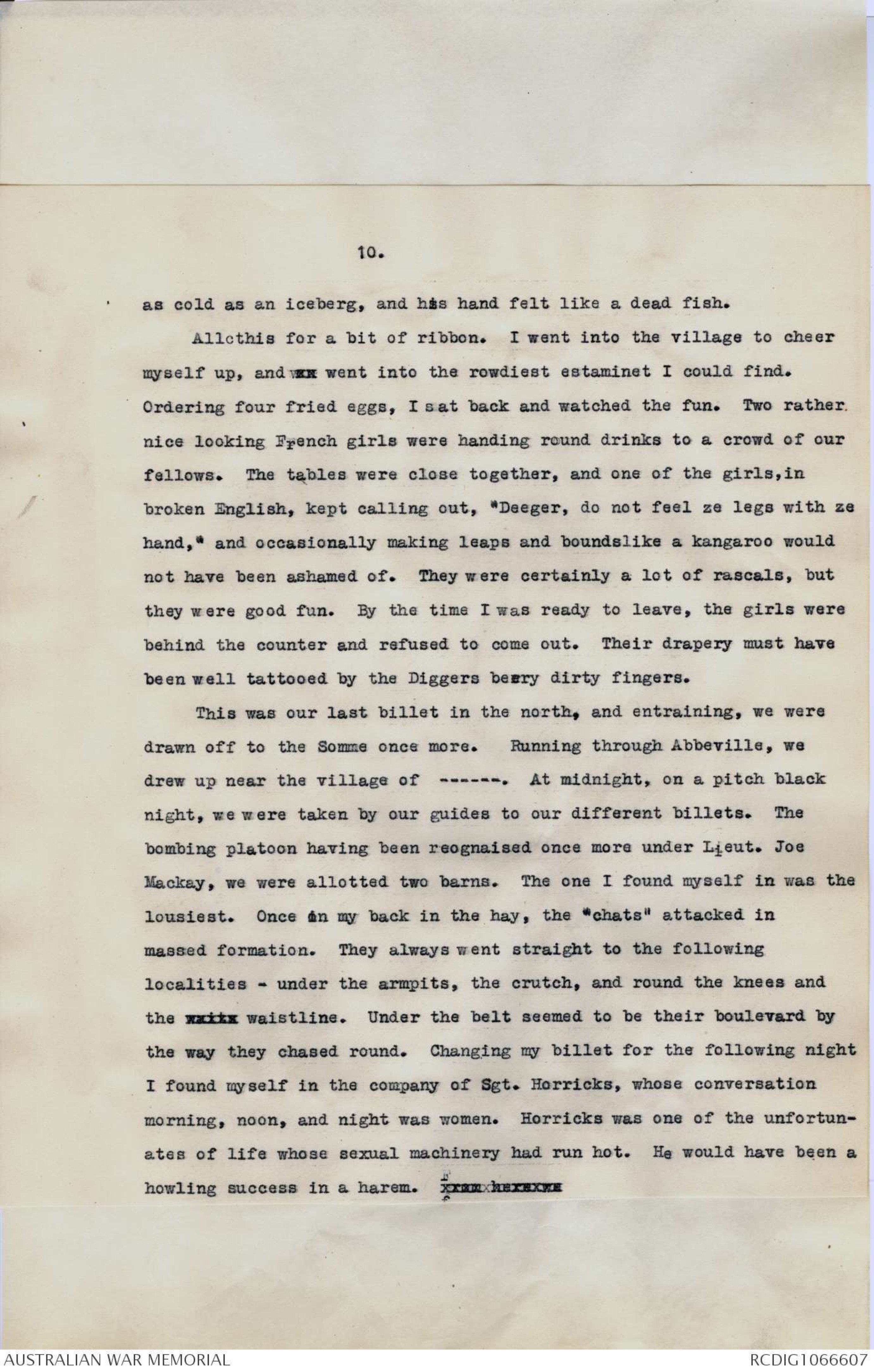
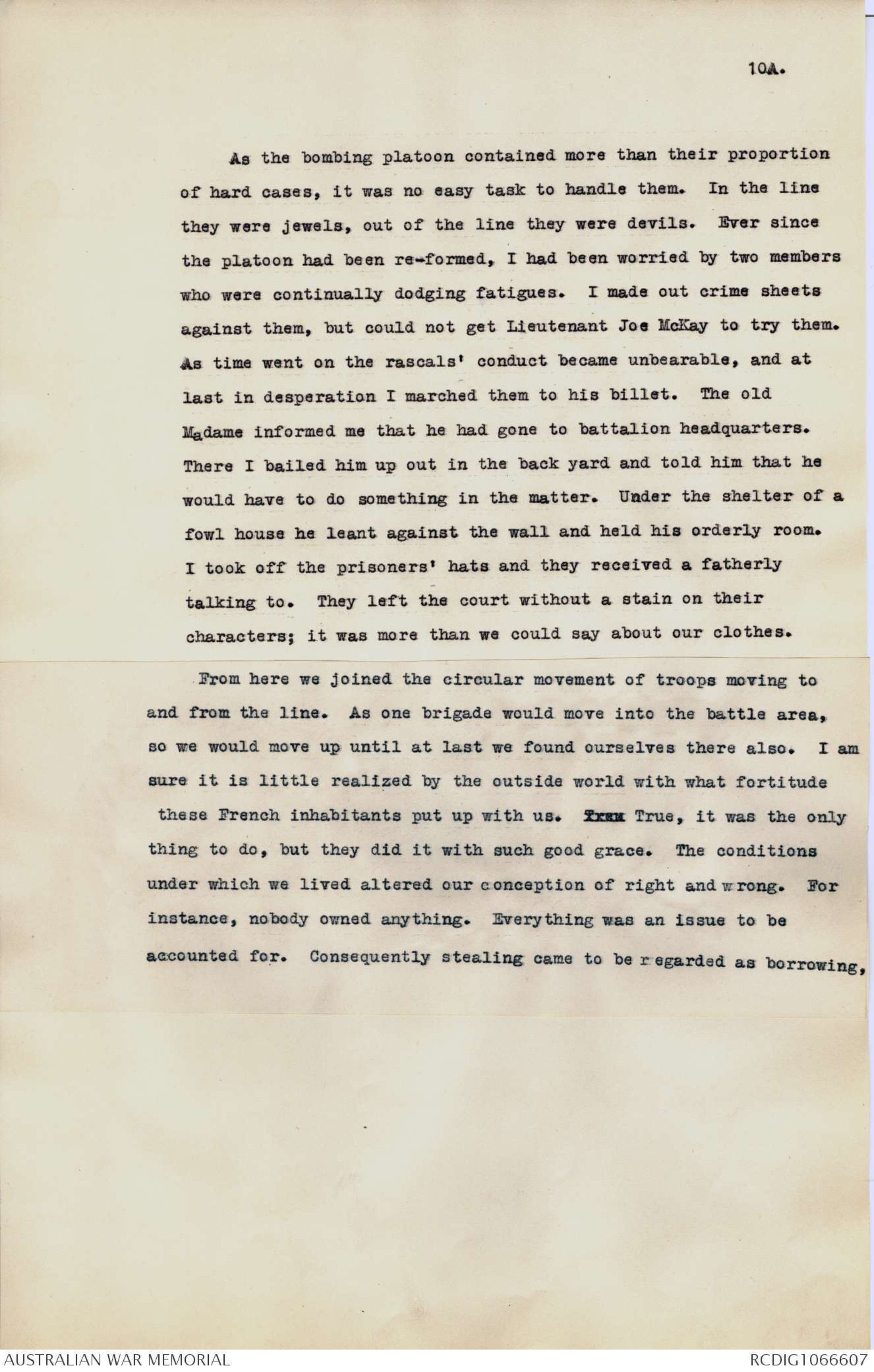
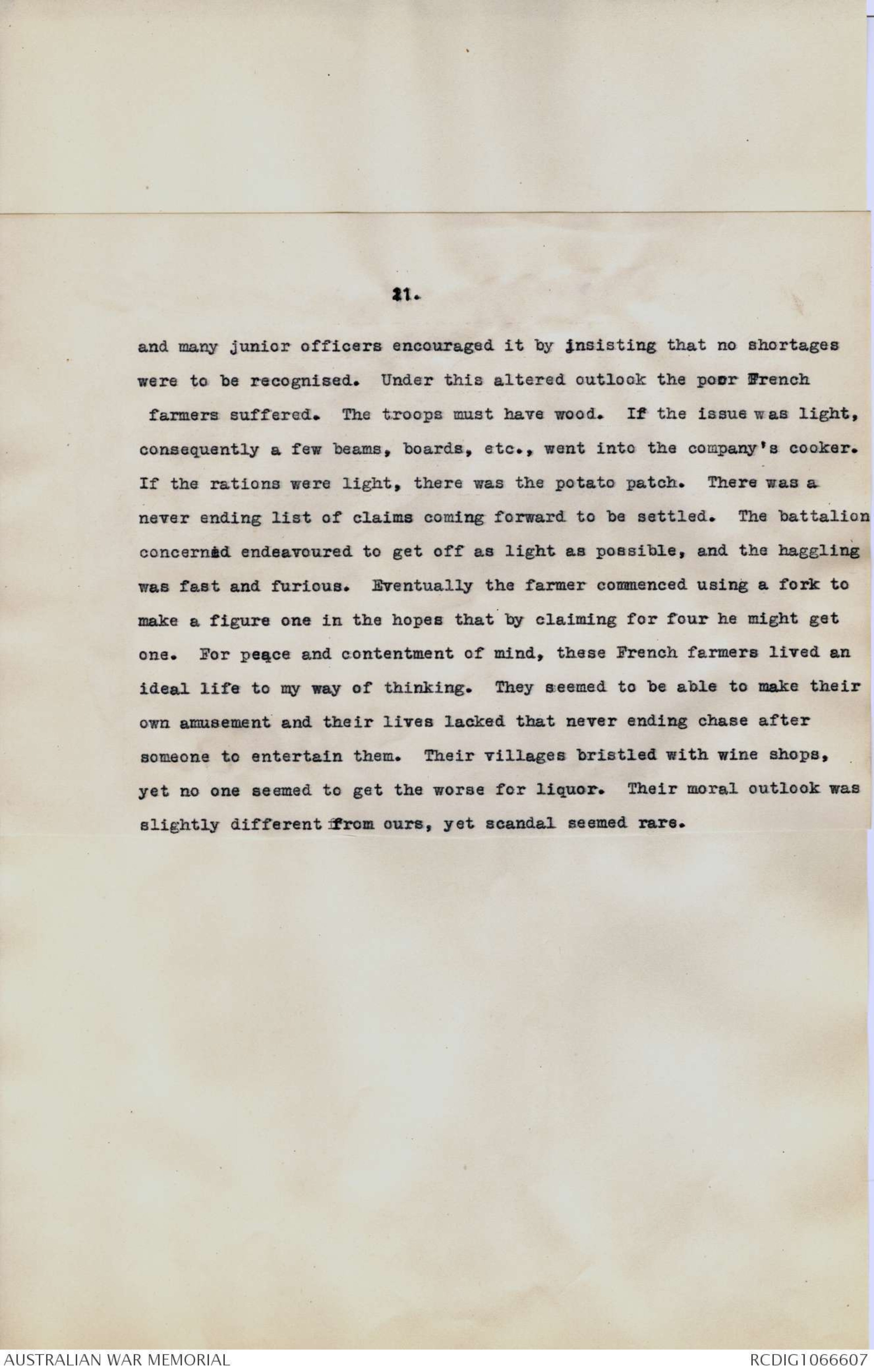
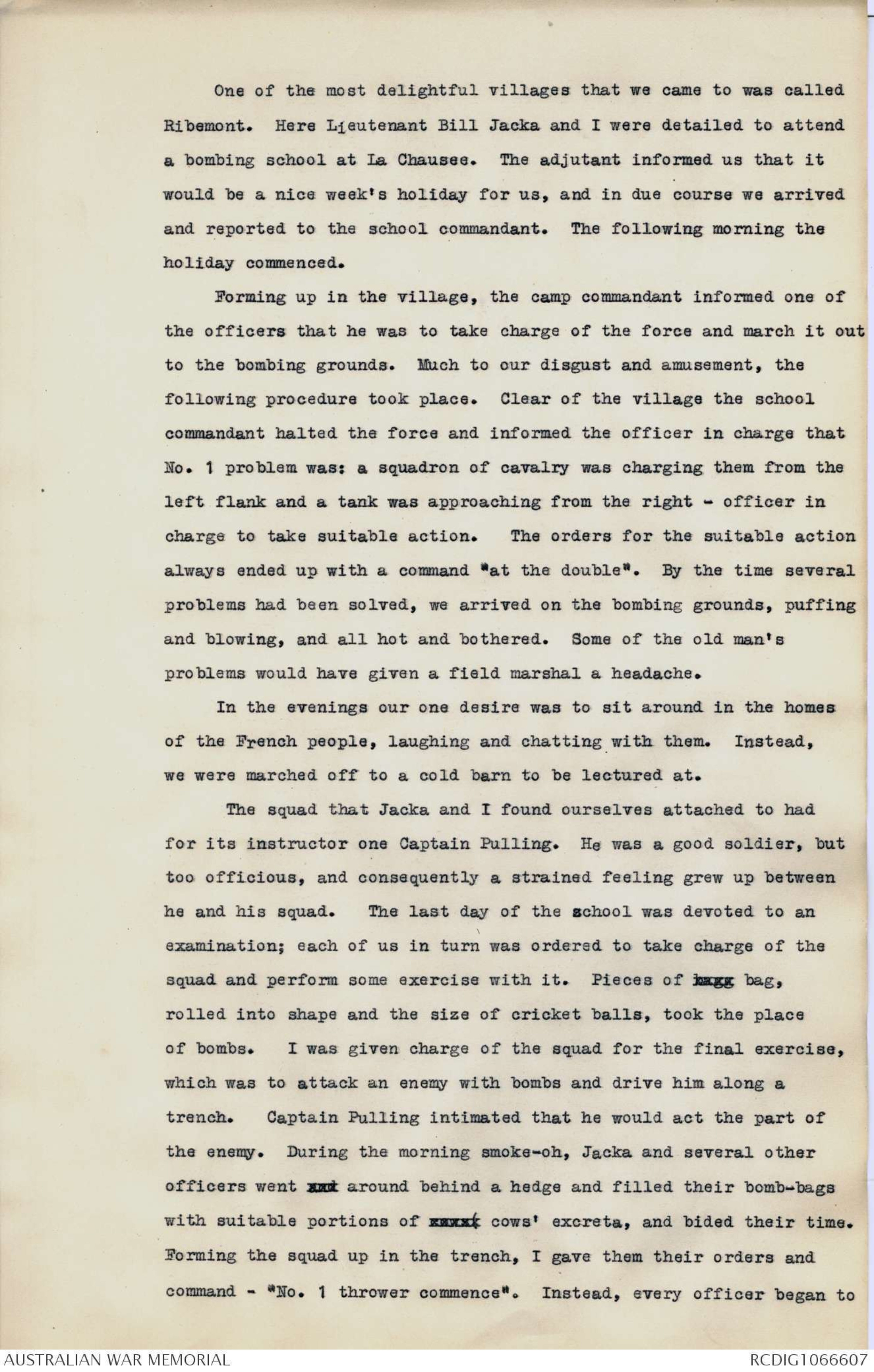
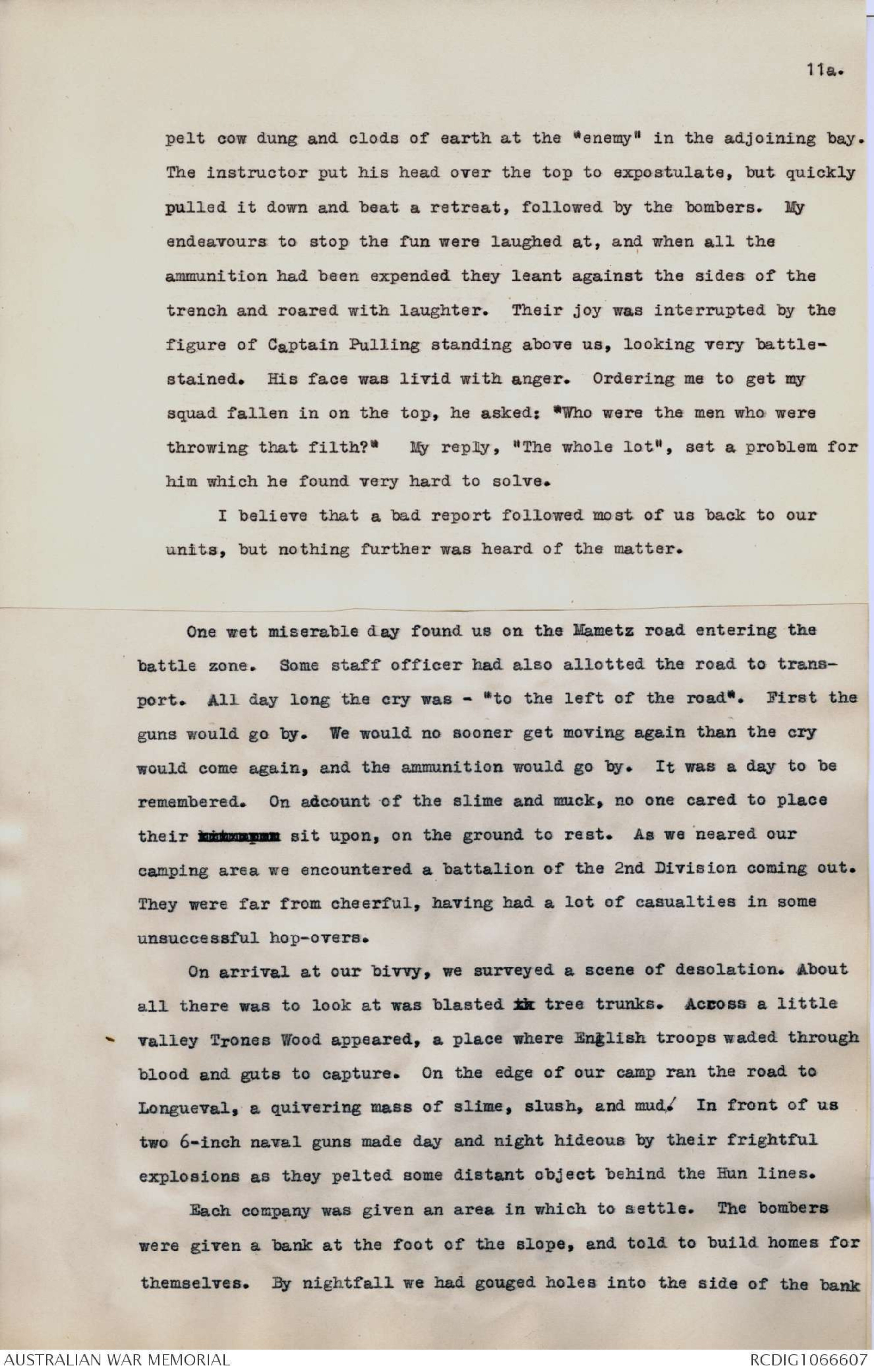
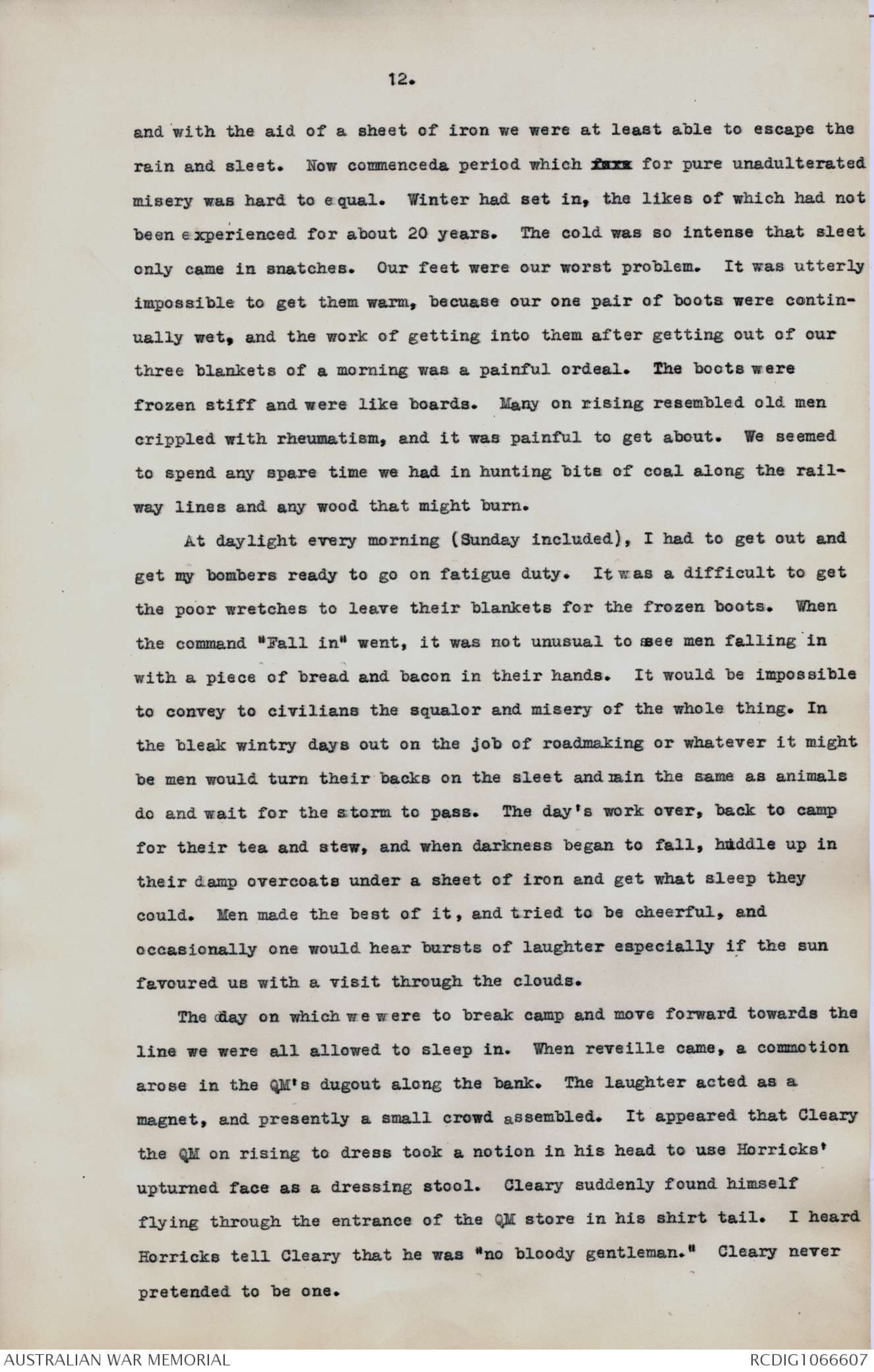
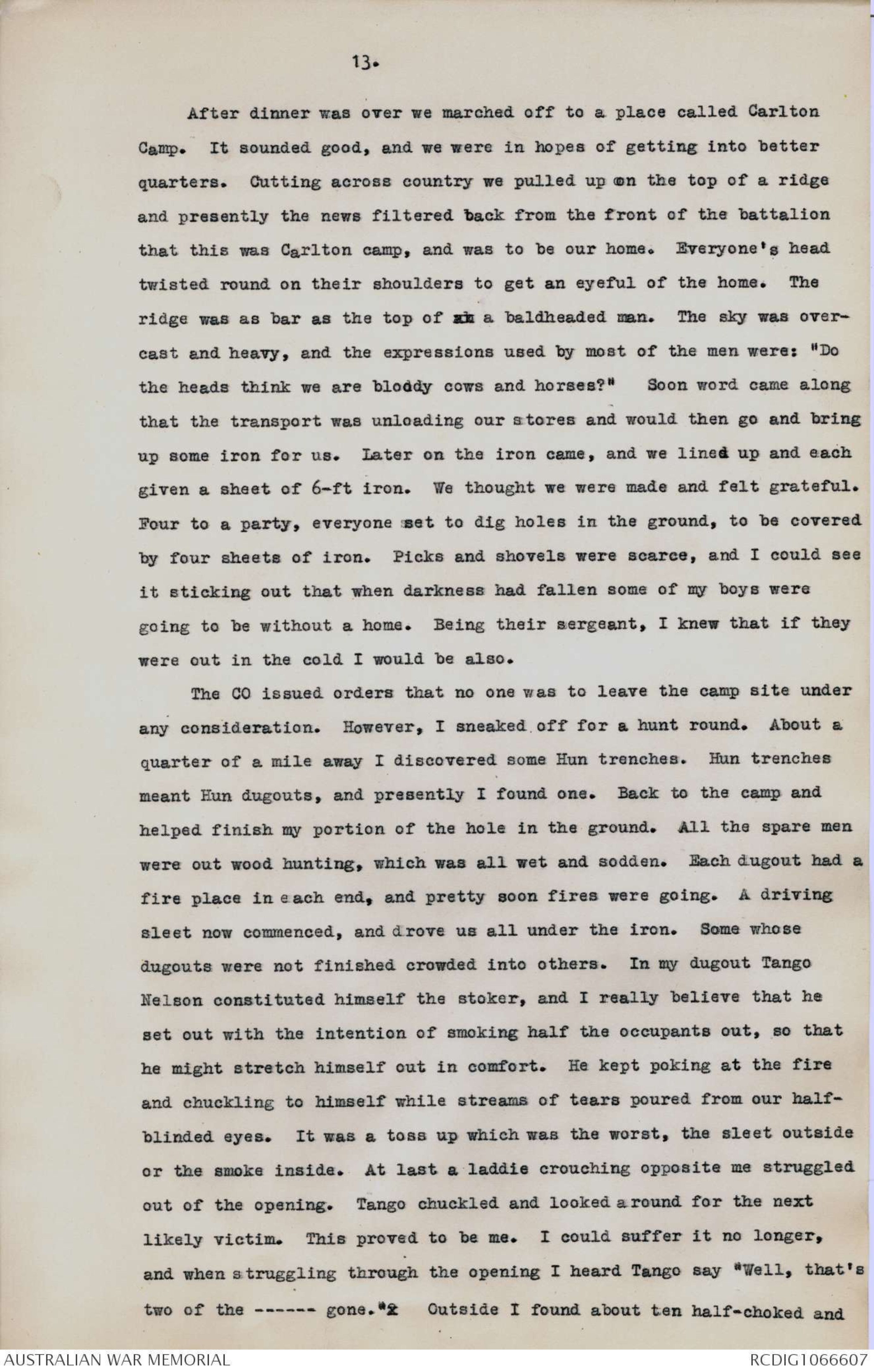
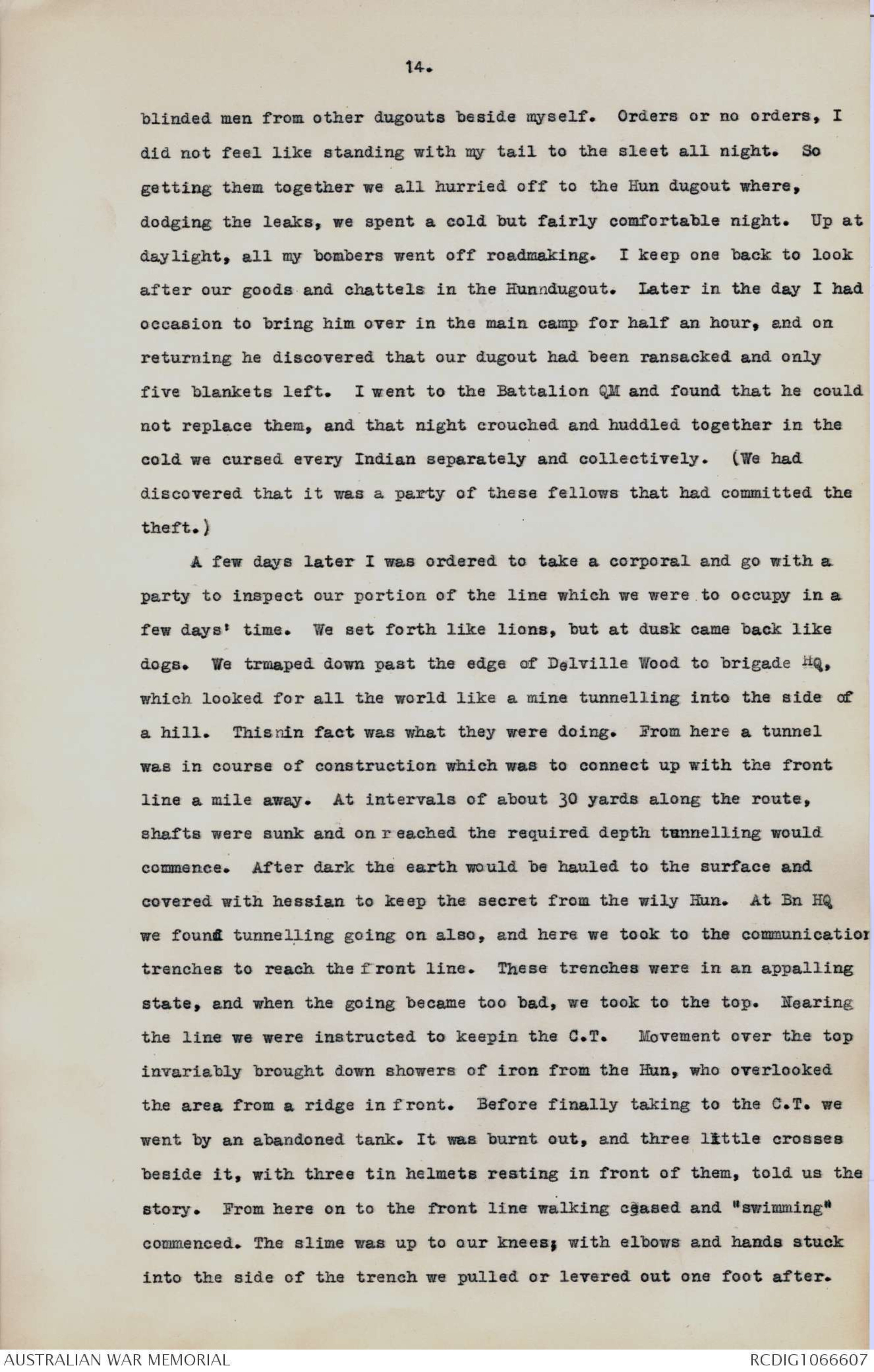
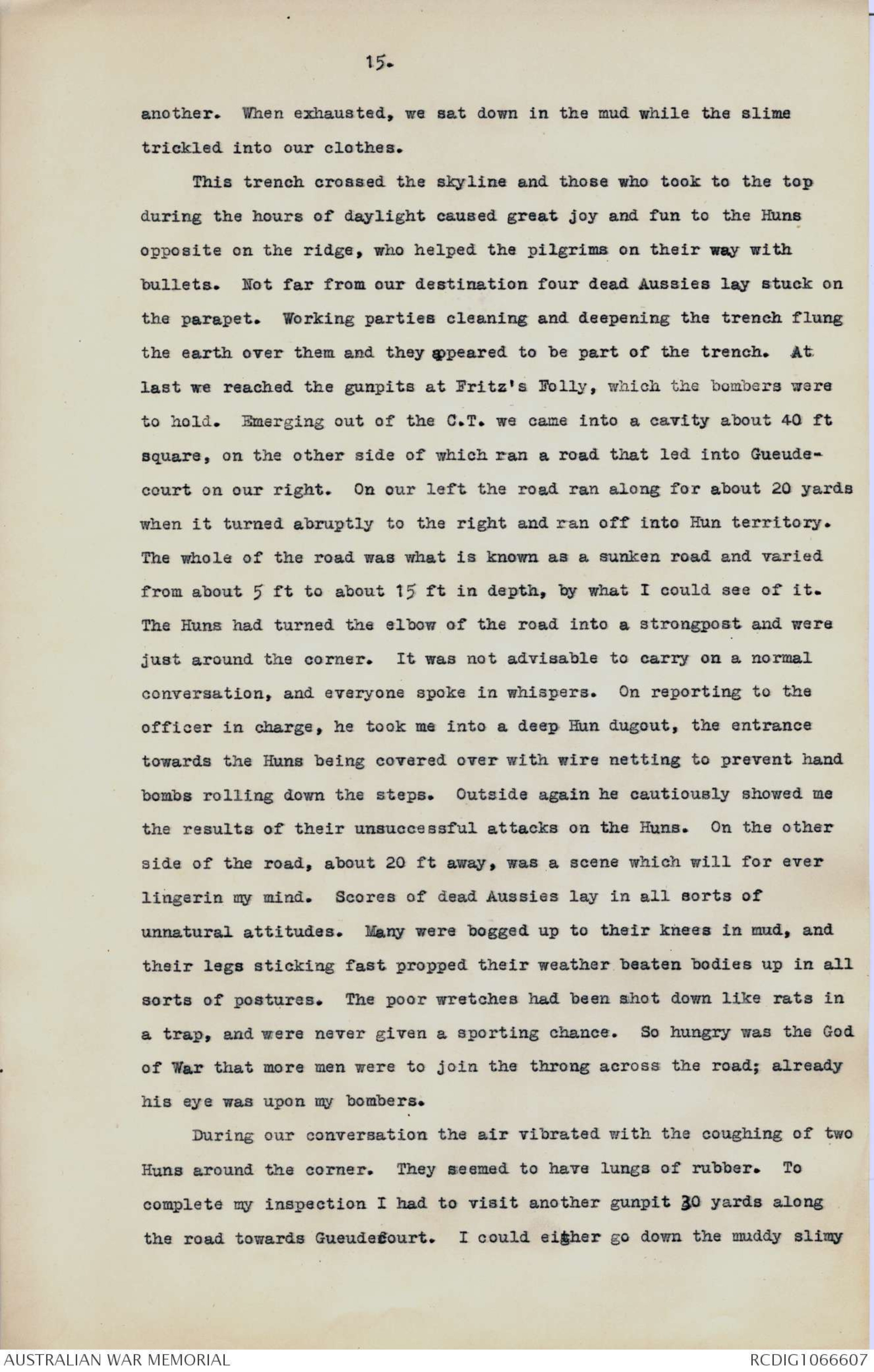
9.
troops in the back area such as the butchers, the bakers, and the
candlestick makers, voted "Yes" almost to a man. The boys who had to
bear the mud and burden of the day voted "No” in a most determined
manner. I have never solved the riddle as to why these fellows who
worshipped at the feet of the goddess of self-sacrifice and who spurned
the ground the cold-footers walked on voted to leave them stay at home.
The nearest approach to the riddle I can get is that a catch cry caught
on. They all repeated this word for word - "I would not bring my worst
bloody enemy over here to go through this."
After leaving this camp we billetted twice before entraining for
the Somme. At the first billet Booley, one of our sergeants, went
out hag hunting and returned home full of sentiment and beer. Booley
had been brought up well, and consequently in the army he missed many
of the little comforts of life. This particular night being dark and
stormy, and not wishing to leave his bed chamber, he used one of my
boots in place of the family poe.
At the second billet orders were issued that all men in the 4th
Division who were to be decorated were to assemble at a certain
village on a given Sunday. In my battalion I was the only"victim,"
on this particular occasion. Lieut. Reg Jones was detailed to parade
me, and one Sunday morning we set out. We walked for two solid hours
and never reached the village. Jones cussed me, and I cussed the
medal that I was to receive. When we reached the parade, Jones
received a receipt for me a la dog fashion, told me I could go to hell
now for all he cared, and went off home. After the church service,
"Birdie" commenced handing out medals and crosses. When my name was
called, he informed me that my medal had gone astray, and he would
give me a piece of ribbon instead. Looking into my eyes and grasping
my hand, he said, "Thank you! Thank you! for what you have done for
us." I felt like a damned fool. He had a lovable personality,
sincere and earnest, but he ruined a lot of the effect by ladling out
"bulsh" by the cartload. With it all, you could not help liking him.
After this part of the show was over, I walked over to where a padre
who had just arrived from Australia was standing. Some of his friends
were mine, and the thought of hearing about them thrilled me. He was
10.
as cold as an iceberg, and his hand felt like a dead fish.
Allcthis for a bit of ribbon. I went into the village to cheer
myself up, and vxx went into the rowdiest estaminet I could find.
Ordering four fried eggs, I sat back and watched the fun. Two rather
nice looking French girls were handing round drinks to a crowd of our
fellows. The tables were close together, and one of the girls, in
broken English, kept calling out, "Deeger, do not feel ze legs with ze
hand," and occasionally making leaps and boundslike a kangaroo would
not have been ashamed of. They were certainly a lot of rascals, but
they were good fun. By the time I was ready to leave, the girls were
behind the counter and refused to come out. Their drapery must have
been well tattooed by the Diggers beery dirty fingers.
This was our last billet in the north, and entraining, we were
drawn off to the Somme once more. Running through Abbeville, we
drew up near the village of ------. At midnight, on a pitch black
night, we were taken by our guides to our different billets. The
bombing platoon having been reognaised once more under Lieut. Joe
Mackay, we were allotted two barns. The one I found myself in was the
lousiest. Once in my back in the hay, the "chats" attacked in
massed formation. They always went straight to the following
localities - under the armpits, the crutch, and round the knees and
the xxxxx waistline. Under the belt seemed to be their boulevard by
the way they chased round. Changing my billet for the following night
I found myself in the company of Sgt. Horricks, whose conversation
morning, noon, and night was women. Horricks was one of the unfortunates
of life whose sexual machinery had run hot. He would have been a
howling success in a harem. From here we
10A.
As the bombing platoon contained more than their proportion
of hard cases, it was no easy task to handle them. In the line
they were jewels, out of the line they were devils. Ever since
the platoon had been re-formed, I had been worried by two members
who were continually dodging fatigues. I made out crime sheets
against them, but could not get Lieutenant Joe McKay to try them.
As time went on the rascals' conduct became unbearable, and at
last in desperation I marched them to his billet. The old
Madame informed me that he had gone to battalion headquarters.
There I bailed him up out in the back yard and told him that he
would have to do something in the matter. Under the shelter of a
fowl house he leant against the wall and held his orderly room.
I took off the prisoners' hats and they received a fatherly
talking to. They left the court without a stain on their
characters; it was more than we could say about our clothes.
From here we joined the circular movement of troops moving to
and from the line. As one brigade would move into the battle area,
so we would move up until at last we found ourselves there also. I am
sure it is little realized by the outside world with what fortitude
these French inhabitants put up with us. Trew True, it was the only
thing to do, but they did it with such good grace. The conditions
under which we lived altered our conception of right and wrong. For
instance, nobody owned anything. Everything was an issue to be
accounted for. Consequently stealing came to be regarded as borrowing,
21.
and many junior officers encouraged it by insisting that no shortages
were to be recognised. Under this altered outlook the poor French
farmers suffered. The troops must have wood. If the issue was light,
consequently a few beams, boards, etc., went into the company's cooker.
If the rations were light, there was the potato patch. There was a
never ending list of claims coming forward to be settled. The battalion
concerned endeavoured to get off as light as possible, and the haggling
was fast and furious. Eventually the farmer commenced using a fork to
make a figure one in the hopes that by claiming for four he might get
one. For peace and contentment of mind, these French farmers lived an
ideal life to my way of thinking. They seemed to be able to make their
own amusement and their lives lacked that never ending chase after
someone to entertain them. Their villages bristled with wine shops,
yet no one seemed to get the worse for liquor. Their moral outlook was
slightly different from ours, yet scandal seemed rare.
One of the most delightful villages that we came to was called
Ribemont. Here Lieutenant Bill Jacka and I were detailed to attend
a bombing school at La Chausee. The adjutant informed us that it
would be a nice week's holiday for us, and in due course we arrived
and reported to the school commandant. The following morning the
holiday commenced.
Forming up in the village, the camp commandant informed one of
the officers that he was to take charge of the force and march it out
to the bombing grounds. Much to our disgust and amusement, the
following procedure took place. Clear of the village the school
commandant halted the force and informed the officer in charge that
No. 1 problem was: a squadron of cavalry was charging them from the
left flank and a tank was approaching from the right - officer in
charge to take suitable action. The orders for the suitable action
always ended up with a command "at the double". By the time several
problems had been solved, we arrived on the bombing grounds, puffing
and blowing, and all hot and bothered. Some of the old man's
problems would have given a field marshal a headache.
In the evenings our one desire was to sit around in the homes
of the French people, laughing and chatting with them. Instead,
we were marched off to a cold barn to be lectured at.
The squad that Jacka and I found ourselves attached to had
for its instructor one Captain Pulling. He was a good soldier, but
too officious, and consequently a strained feeling grew up between
he and his squad. The last day of the school was devoted to an
examination; each of us in turn was ordered to take charge of the
squad and perform some exercise with it. Pieces of bagg bag,
rolled into shape and the size of cricket balls, took the place
of bombs. I was given charge of the squad for the final exercise,
which was to attack an enemy with bombs and drive him along a
trench. Captain Pulling intimated that he would act the part of
the enemy. During the morning smoke-oh, Jacka and several other
officers went and around behind a hedge and filled their bomb-bags
with suitable portions of xxxxx cows' excreta, and bided their time.
Forming the squad up in the trench, I gave them their orders and
command - "No. 1 thrower commence". Instead, every officer began to
11a.
pelt cow dung and clods of earth at the "enemy" in the adjoining bay.
The instructor put his head over the top to expostulate, but quickly
pulled it down and beat a retreat, followed by the bombers. My
endeavours to stop the fun were laughed at, and when all the
ammunition had been expended they leant against the sides of the
trench and roared with laughter. Their joy was interrupted by the
figure of Captain Pulling standing above us, looking very battle-stained.
His face was livid with anger. Ordering me to get my
squad fallen in on the top, he asked: "Who were the men who were
throwing that filth?" My reply, "The whole lot", set a problem for
him which he found very hard to solve.
I believe that a bad report followed most of us back to our
units, but nothing further was heard of the matter.
One wet miserable day found us on the Mametz road entering the
battle zone. Some staff officer had also allotted the road to transport.
All day long the cry was - "to the left of the road". First the
guns would go by. We would no sooner get moving again than the cry
would come again, and the ammunition would go by. It was a day to be
remembered. On account of the slime and muck, no one cared to place
their xxxxxxxxx sit upon, on the ground to rest. As we neared our
camping area we encountered a battalion of the 2nd Division coming out.
They were far from cheerful, having had a lot of casualties in some
unsuccessful hop-overs.
On arrival at our bivvy, we surveyed a scene of desolation. About
all there was to look at was blasted xx tree trunks. Across a little
valley Trones Wood appeared, a place where English troops waded through
blood and guts to capture. On the edge of our camp ran the road to
Longueval, a quivering mass of slime, slush, and mud. In front of us
two 6-inch naval guns made day and night hideous by their frightful
explosions as they pelted some distant object behind the Hun lines.
Each company was given an area in which to settle. The bombers
were given a bank at the foot of the slope, and told to build homes for
themselves. By nightfall we had gouged holes into the side of the bank
12.
and with the aid of a sheet of iron we were at least able to escape the
rain and sleet. Now commenceda period which fore for pure unadulterated
misery was hard to equal. Winter had set in, the likes of which had not
been experienced for about 20 years. The cold was so intense that sleet
only came in snatches. Our feet were our worst problem. It was utterly
impossible to get them warm, becuase our one pair of boots were continually
wet, and the work of getting into them after getting out of our
three blankets of a morning was a painful ordeal. The boots were
frozen stiff and were like boards. Many on rising resembled old men
crippled with rheumatism, and it was painful to get about. We seemed
to spend any spare time we had in hunting bits of coal along the railway
lines and any wood that might burn.
At daylight every morning (Sunday included), I had to get out and
get my bombers ready to go on fatigue duty. It was a difficult to get
the poor wretches to leave their blankets for the frozen boots. When
the command "Fall in" went, it was not unusual to see men falling in
with a piece of bread and bacon in their hands. It would be impossible
to convey to civilians the squalor and misery of the whole thing. In
the bleak wintry days out on the job of roadmaking or whatever it might
be men would turn their backs on the sleet and rain the same as animals
do and wait for the storm to pass. The day's work over, back to camp
for their tea and stew, and when darkness began to fall, huddle up in
their damp overcoats under a sheet of iron and get what sleep they
could. Men made the best of it, and tried to be cheerful, and
occasionally one would hear bursts of laughter especially if the sun
favoured us with a visit through the clouds.
The day on which we were to break camp and move forward towards the
line we were all allowed to sleep in. When reveille came, a commotion
arose in the QM's dugout along the bank. The laughter acted as a
magnet, and presently a small crowd assembled. It appeared that Cleary
the QM on rising to dress took a notion in his head to use Horricks'
upturned face as a dressing stool. Cleary suddenly found himself
flying through the entrance of the QM store in his shirt tail. I heard
Horricks tell Cleary that he was 'no bloody gentleman." Cleary never
pretended to be one.
13.
After dinner was over we marched off to a place called Carlton
Camp. It sounded good, and we were in hopes of getting into better
quarters. Cutting across country we pulled up on the top of a ridge
and presently the news filtered back from the front of the battalion
that this was Carlton camp, and was to be our home. Everyone's head
twisted round on their shoulders to get an eyeful of the home. The
ridge was as bar as the top of xx a baldheaded man. The sky was overcast
and heavy, and the expressions used by most of the men were: "Do
the heads think we are bloody cows and horses?" Soon word came along
that the transport was unloading our stores and would then go and bring
up some iron for us. Later on the iron came, and we lined up and each
given a sheet of 6-ft iron. We thought we were made and felt grateful.
Four to a party, everyone sset to dig holes in the ground, to be covered
by four sheets of iron. Picks and shovels were scarce, and I could see
it sticking out that when darkness had fallen some of my boys were
going to be without a home. Being their sergeant, I knew that if they
were out in the cold I would be also.
The CO issued orders that no one was to leave the camp site under
any consideration. However, I sneaked off for a hunt round. About a
quarter of a mile away I discovered some Hun trenches. Hun trenches
meant Hun dugouts, and presently I found one. Back to the camp and
helped finish my portion of the hole in the ground. All the spare men
were out wood hunting, which was all wet and sodden. Each dugout had a
fire place in each end, and pretty soon fires were going. A driving
sleet now commenced, and drove us all under the iron. Some whose
dugouts were not finished crowded into others. In my dugout Tango
Nelson constituted himself the stoker, and I really believe that he
set out with the intention of smoking half the occupants out, so that
he might stretch himself out in comfort. He kept poking at the fire
and chuckling to himself while streams of tears poured from our half-blinded
eyes. It was a toss up which was the worst, the sleet outside
or the smoke inside. At last a laddie crouching opposite me struggled
out of the opening. Tango chuckled and looked around for the next
likely victim. This proved to be me. I could suffer it no longer,
and when struggling through the opening I heard Tango say "Well, that's
two of the ------ gone."x Outside I found about ten half-choked and
14.
blinded men from other dugouts beside myself. Orders or no orders, I
did not feel like standing with my tail to the sleet all night. So
getting them together we all hurried off to the Hun dugout where,
dodging the leaks, we spent a cold but fairly comfortable night. Up at
daylight, all my bombers went off roadmaking. I keep one back to look
after our goods and chattels in the Hunndugout. Later in the day I had
occasion to bring him over in the main camp for half an hour, and on
returning he discovered that our dugout had been ransacked and only
five blankets left. I went to the Battalion QM and found that he could
not replace them, and that night crouched and huddled together in the
cold we cursed every Indian separately and collectively. (We had
discovered that it was a party of these fellows that had committed the
theft.)
A few days later I was ordered to take a corporal and go with a
party to inspect our portion of the line which we were to occupy in a
few days' time. We set forth like lions, but at dusk came back like
dogs. We trmaped down past the edge of Delville Wood to brigade HQ,
which looked for all the world like a mine tunnelling into the side of
a hill. Thisnin fact was what they were doing. From here a tunnel
was in course of construction which was to connect up with the front
line a mile away. At intervals of about 30 yards along the route,
shafts were sunk and on reached the required depth tunnelling would
commence. After dark the earth would be hauled to the surface and
covered with hessian to keep the secret from the wily Hun. At Bn HQ
we found tunnelling going on also, and here we took to the communication
trenches to reach the front line. These trenches were in an appalling
state, and when the going became too bad, we took to the top. Nearing
the line we were instructed to keepin the C.T. Movement over the top
invariably brought down showers of iron from the Hun, who overlooked
the area from a ridge in front. Before finally taking to the C.T. we
went by an abandoned tank. It was burnt out, and three little crosses
beside it, with three tin helmets resting in front of them, told us the
story. From here on to the front line walking ceased and "swimming"
commenced. The slime was up to our knees; with elbows and hands stuck
into the side of the trench we pulled or levered out one foot after.
15.
another. When exhausted, we sat down in the mud while the slime
trickled into our clothes.
This trench crossed the skyline and those who took to the top
during the hours of daylight caused great joy and fun to the Huns
opposite on the ridge, who helped the pilgrims on their way with
bullets. Not far from our destination four dead Aussies lay stuck on
the parapet. Working parties cleaning and deepening the trench flung
the earth over them and they appeared to be part of the trench. At
last we reached the gunpits at Fritz's Folly, which the bombers were
to hold. Emerging out of the C.T. we came into a cavity about 40 ft
square, on the other side of which ran a road that led into Gueudecourt
on our right. On our left the road ran along for about 20 yards
when it turned abruptly to the right and ran off into Hun territory.
The whole of the road was what is known as a sunken road and varied
from about 5 ft to about 15 ft in depth, by what I could see of it.
The Huns had turned the elbow of the road into a strongpost and were
just around the corner. It was not advisable to carry on a normal
conversation, and everyone spoke in whispers. On reporting to the
officer in charge, he took me into a deep Hun dugout, the entrance
towards the Huns being covered over with wire netting to prevent hand
bombs rolling down the steps. Outside again he cautiously showed me
the results of their unsuccessful attacks on the Huns. On the other
side of the road, about 20 ft away, was a scene which will for ever
lingerin my mind. Scores of dead Aussies lay in all sorts of
unnatural attitudes. Many were bogged up to their knees in mud, and
their legs sticking fast propped their weather beaten bodies up in all
sorts of postures. The poor wretches had been shot down like rats in
a trap, and were never given a sporting chance. So hungry was the God
of War that more men were to join the throng across the road; already
his eye was upon my bombers.
During our conversation the air vibrated with the coughing of two
Huns around the corner. They seemed to have lungs of rubber. To
complete my inspection I had to visit another gunpit 30 yards along
the road towards Gueudefourt. I could either go down the muddy slimy
 Deb Parkinson
Deb ParkinsonThis transcription item is now locked to you for editing. To release the lock either Save your changes or Cancel.
This lock will be automatically released after 60 minutes of inactivity.